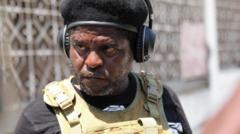Mali's military government announced the arrest of a French national, Yann Vezilier, accusing him of espionage intended to disrupt the nation's stability, amid growing political tensions and a security crisis exacerbated by jihadist activity.
French National Arrested in Alleged Mali Coup Conspiracy

French National Arrested in Alleged Mali Coup Conspiracy
Mali's junta claims a French citizen was plotting to destabilize the country in service of foreign intelligence.
In a significant escalation of political unrest, Mali's military junta has detained a French national, believed to be involved in a conspiracy aimed at undermining the country’s government. In a televised statement late Thursday, the junta charged that Yann Vezilier was acting on behalf of the French intelligence service. His arrest raises suspicions of foreign interference as the nation grapples with a protracted security crisis dating back to 2012, characterized by an insurgency from jihadist groups.
The allegations were brought forth by Mali's Security Minister, Gen Daoud Aly Mohammedine, who indicated that Vezilier’s involvement is part of a broader plot involving "fringe elements" within the Malian military. Along with Vezilier's apprehension, two army generals, including former Mopti governor Gen Abass Dembele, were also arrested in connection with the coup attempt. Reports suggest that over 55 soldiers have been detained, indicating a deepening crisis within the military.
General Mohammedine described the situation as under control and assured that investigations are ongoing to ascertain potential accomplices. He criticized "foreign states" for attempting to destabilize Mali, hinting at a coordinated effort to create chaos. The public indictment against Vezilier and the highlighted involvement of military figures signal escalating tensions following a series of high-profile arrests this summer, including former Prime Ministers accused of damaging the state’s image.
Political unrest has intensified in Mali, particularly following the junta's dissolution of all political parties earlier this year amid anti-government protests. Junta leader Gen Asimi Goïta, who has been in power since two military coups in 2020 and 2021, has faced growing discontent over his broken promise to hold elections.
While Mali has sought more robust alliances, particularly with Russia, to combat insurgent threats, the security situation remains precarious. With marital ties reexamined and external influences becoming a focal point of national discourse, Mali's political landscape continues to evolve under the shadow of instability and foreign suspicion.
The allegations were brought forth by Mali's Security Minister, Gen Daoud Aly Mohammedine, who indicated that Vezilier’s involvement is part of a broader plot involving "fringe elements" within the Malian military. Along with Vezilier's apprehension, two army generals, including former Mopti governor Gen Abass Dembele, were also arrested in connection with the coup attempt. Reports suggest that over 55 soldiers have been detained, indicating a deepening crisis within the military.
General Mohammedine described the situation as under control and assured that investigations are ongoing to ascertain potential accomplices. He criticized "foreign states" for attempting to destabilize Mali, hinting at a coordinated effort to create chaos. The public indictment against Vezilier and the highlighted involvement of military figures signal escalating tensions following a series of high-profile arrests this summer, including former Prime Ministers accused of damaging the state’s image.
Political unrest has intensified in Mali, particularly following the junta's dissolution of all political parties earlier this year amid anti-government protests. Junta leader Gen Asimi Goïta, who has been in power since two military coups in 2020 and 2021, has faced growing discontent over his broken promise to hold elections.
While Mali has sought more robust alliances, particularly with Russia, to combat insurgent threats, the security situation remains precarious. With marital ties reexamined and external influences becoming a focal point of national discourse, Mali's political landscape continues to evolve under the shadow of instability and foreign suspicion.



















